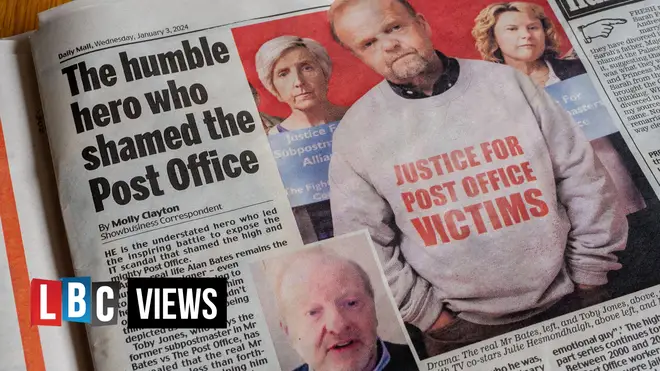
Paul Brand 10am - 12pm
18 January 2024, 17:14

The key to exposing the nature and scale of great injustices may not always lie with senior politicians or expensive lawyers. Instead, it comes from the collective power of people and community.
A TV drama, ‘Mr Bates Versus the Post Office’ has stirred up an outpouring of collective anger and guilt. The story of the hundreds of UK postal workers bullied, bankrupted and jailed between 1999 and 2015, as a result of a computer fault which recorded losses, where none had occurred, is not a new one. Newspapers and TV news programmes had reported on it at every stage.
But brought to life as a drama by ITV, it allowed viewers to witness the misery, tears and heartbreak playing out on peak television.
At the heart of the story, Alan Bates (played by Toby Jones) brings together 40 ex sub-postmasters for the first time in a village hall in Fenny Compton, Warwickshire – a ‘middle England’ town he’d picked at random off a map.
It was this now-historic gathering that ultimately acted as the catalyst for unveiling this wretched tale of mass social injustice.
Individual postal managers who thought they were ‘the only ones’ being accused of irregularity realised they were part, not only of a much bigger computer blunder, but also of a group big enough to do something about it.
It’s a story we’ve seen time and again over the last few years.
Last year, The Rail Delivery Group announced plans for wholesale ticket office closures across the country, limiting transport options for a number of vulnerable people, including the disabled and the elderly.
However, through the collective action of ‘ordinary’ people, the Government U-turned on its proposals, as an unprecedented 75,000 individuals responded to the public consultation – with an overwhelming 99% objecting to the plans.
In retail, supermarket Booths announced last year that it was replacing its self-checkout stations with real people, following an onslaught of complaints regarding the tech’s unreliable and impersonal nature – with people preferring to be served by human beings rather than artificial intelligence.
And, with more than 1,000 bank branches closing their doors in the last two years, we’ve seen the collective power of people bring back opportunities for in-person interaction through planned ‘banking hubs’, much to the joy of those who prefer to do their banking face-to-face.
At its core, this is the power of Belonging in action.
A sense of Belonging is a sense of Power, of People, of being able to exercise influence on decision-making. It is a sense of community and togetherness, of understanding how to amplify excluded voices and hold those in power accountable to their actions.
Alan Bates could not have acted alone. He needed the collective power of community to bring about the change so desperately needed for the victims of one of the biggest public coverups of the last two decades.
Whilst the Government continues to find ways to clear the names of those wrongfully convicted, may we be reminded of how loud all our voices can be when they are joined together.
LBC Views provides a platform for diverse opinions on current affairs and matters of public interest. The views expressed are those of the authors and do not necessarily reflect the official LBC position.
To contact us email views@lbc.co.uk